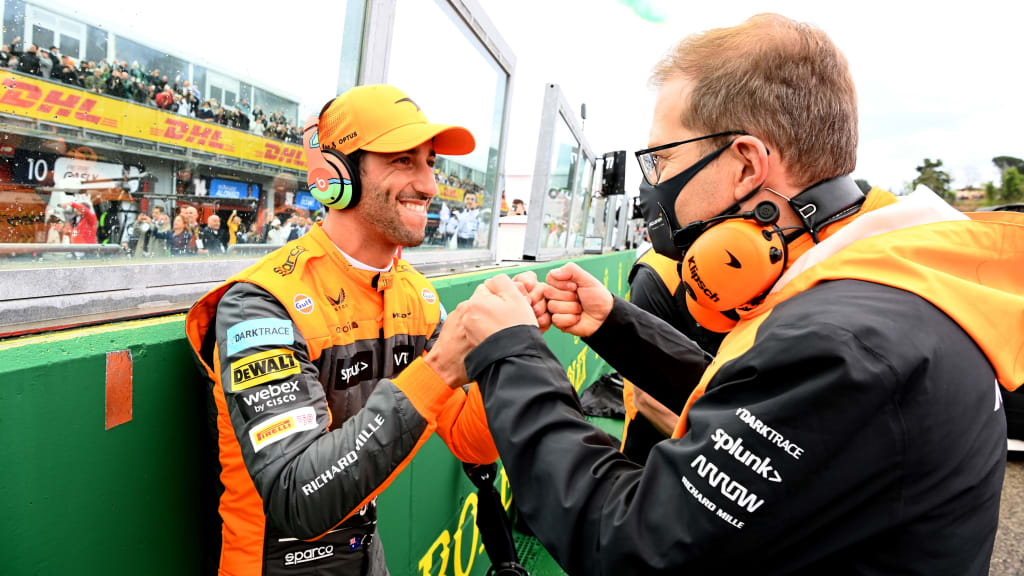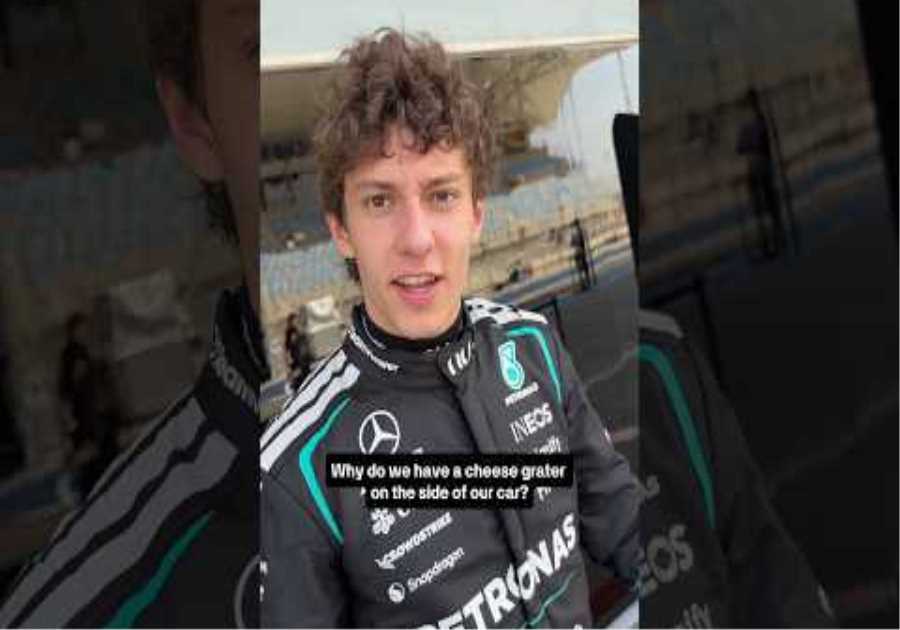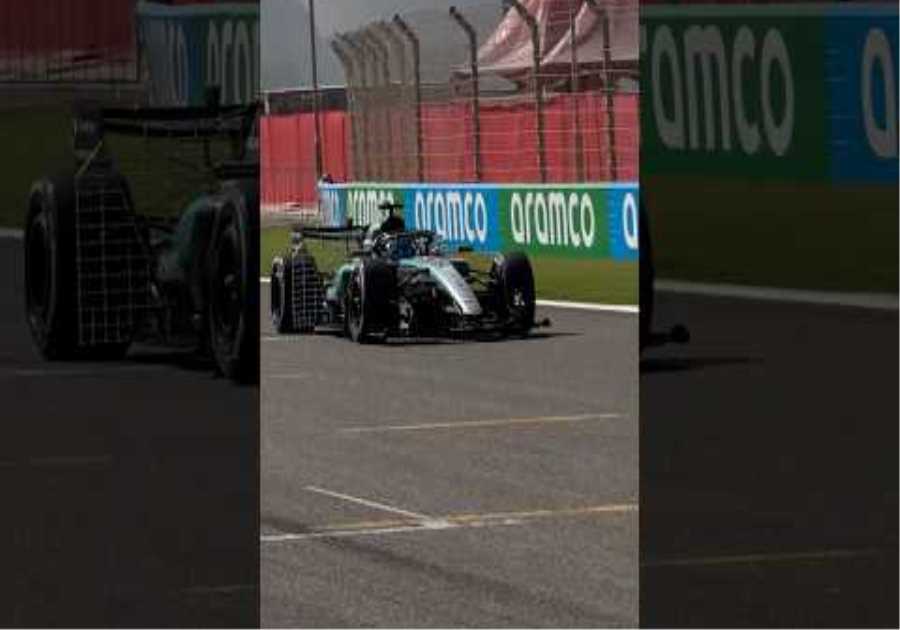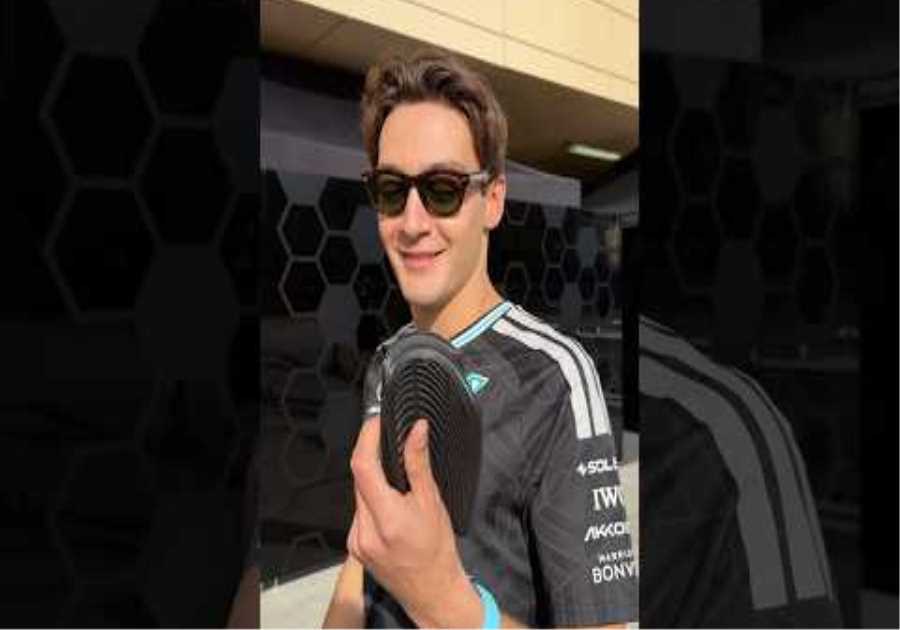
You probably can’t relate to what it’s like to drive a race car at the highest level of the sport, and by “you” I definitely include me: I’ve spent a day at Skip Barber Racing School. I’ve driven go-karts with Nascar drivers. I’ve ridden shotgun with two-time Cup Series winner Ross Chastain.
What professional racers do bears no relation to what I do in a race car; we might as well be performing two completely different physical tasks.
But everyone — especially entrepreneurs, whose livelihoods and self-esteem often feel at risk with every decision they make — can relate to the mental challenges involved in performing at their highest level. Building and maintaining confidence. Dealing with pressure. Coping with external and internal expectations.
Which is why everyone can relate to Formula 1 driver Daniel Ricciardo of McLaren Racing (if only because most of us — and by “most of us,” I’m included again — would like to be as engaging and outgoing). Ricciardo has won eight F1 races. He’s been on the podium 32 times.
In a sport where careers are often measured in a handful of years, he’s raced in Formula 1 for over a decade.
So yeah: He knows a little bit about coping with pressure and dealing with expectations, especially his own.
How much of your pre-race routine is mental and not just physical preparation?
A bit of both. As much as I have a routine, I’m not completely fixed on it. At some races we might get a last-minute guest of the team, or someone knocks on our door. There are often interruptions.
So I can’t approach my race prep as “If I don’t do everything perfectly, I’m screwed.” [Laughs.]
But some things are consistent. Dynamic movement to loosen up. Putting my headphones on, listening to music, and doing some breathing. That’s where I start the internal dialogue with myself and switch into that zone.
Of course I sometimes get frustrated. Our race day is extremely full. While we usually have a 45-minute window to prepare, every minute of the day is crucial. So I try really hard not to get frustrated. If I think, “Man, I just lost five minutes,” and vent that, then I’ve just lost a few more minutes.
That leads to another point. There’s a concept called neutral thinking–trying to never get too high or too low and just deal with the moment. How do you maintain a balance between excitement after an overtake and frustration if you wind up on the wrong tire strategy?
On track is where that’s the trickiest. And it’s not just me. Keep in mind everything every person on the team does builds toward this two-hour ball of energy.
If I overtake, I’ll give myself a bit of a pump-up and that motivates me to attack the next car.
When something doesn’t go well, it’s a lot more difficult to accept and just focus on the next corner. But that’s where staying neutral is most important: The more corners you lose dwelling on what happened, that’s one second you just lost, another second you just lost. You’re just digging at even deeper hole.
Say we have a bad pit stop. That sucks, but it’s over. We can’t go back and fix it. We can talk about it after the race, but it does no one any good to focus on it now.
I think that’s true in any profession. Save the debrief for later. In the moment, focus on what you need to do now.
[Here’s an example of Daniel’s ability to quickly return to neutral.]
On the flip side, potential success can sometimes be almost paralyzing. Take Monza last year–few people expected McLaren to be leading late in the race. How did you stay calm and focused?
I know what you’re saying. The “I can’t screw this up” feeling.
The highs aren’t hard to keep in check anymore. When I took the lead in Montreal eight years ago yesterday — not that I’m counting [laughs] — a little bit of paranoia crept in and I thought, “I’m about to win my first F1 race! Don’t [mess] this up.”
Now that I’ve built confidence and inner belief, at Monza I wasn’t thinking I couldn’t wait for the race to be over. I was literally thinking, “I haven’t led a race in so long, I want to enjoy this feeling. I want this feeling, where everyone is trying to catch me, to last.”
That’s how I turned that emotion on his head.
The efforts of hundreds of people, and millions of dollars, go into putting your and Lando Norris’s car on the track. You’re at the very tip of a massive pyramid. The idea that you might crash in the first corner and spoil all that time and effort for everyone–how did you find a place for that?
Again, it’s not just me. Everyone’s job is crucial. Mine is just one of the most visible.
In my case, I decided early in my career that I would rather go down swinging as opposed to being too “caring” and never get results. If I do crash — if I go for a move and it doesn’t come off — that’s not the outcome I want, but in my heart I feel at peace knowing I left it all out there.
It’s especially tricky at the start of a race, though. You don’t want to take yourself out, but if you’re too cautious, you get eaten up. That’s when mental preparation is extremely important: Establishing the right balance of aggression and patience and being hyper-aware in those first few moments.
Let’s pretend you’re starting sixth. Do you map out a number of potential scenarios, even though no start probably goes any of the ways you imagine?
Starts can be incredibly hard to get right. I do try to prepare myself with multiple scenarios.
And there are tracks where I’ll have a favorite approach: Turn one at a certain track, maybe I prefer to be on the outside going into the first turn. Through experience I have a mental database, but sometimes you literally say what the [heck]I’ll embrace whatever happens and react and make it look like I had a plan. [Laughs.]
[While that might sound like winging it, science endorses that approach, at least in someone like Daniel’s case. As the researchers of this study write, “Although there’s a common misconception that intuitive decisions are random and signify a lack of skill, the exact opposite is true. Intuitive decisions are often the product of years of experience and thousands of hours of practice. They represent the most efficient use of your accumulated experience.”]
You have to have the confidence you can react well. How do you maintain confidence in a sport where you’re only as good as your last lap?
I wasn’t always confident, especially when I first got to Formula 1. I was pretty overwhelmed. Racing in F1 was a dream for me. No one from Perth had ever made it, there I was…
So when I got there, I really wasn’t sure I belonged. I believed in my ability, but I still didn’t believe I belonged.
Was there a moment when that changed?
The first instance was in 2012 in my first full season in F1. We were in Japan, near the end of the race, battling for 10th place with [seven-time champion] Michael sSchumacher. Tenth doesn’t sound like much, but 10th would be big for our team.
As soon as he got close to me I thought, “Oh no.” But I defended him for one lap. Then two. Then three. Then four. And all of a sudden I started to think, “Holy [crap]I can do this.”
That was probably the first big moment where a guy I admire, one of the greatest of all time, and there I was able to hold my own.
Later he came up to me and said, “Hey, you defended really well.”
Doing that, and getting that recognition from someone like him, made me start to feel like, “Hey, I can do this.”
This question is from Paul Thiebaut III via LinkedIn: What types of messages did your parents give you as a young racer — in particular, intrinsic versus extrinsic forms of encouragement?
My dad says, even today, “Do what you do best.”
He’s not saying, “You’re better than everyone.” He’s saying, “Go out there and have fun. You love doing this. It’s what you do best. So just go do it.” It’s his way of saying forget the noise, forget the hype, and remember why you got into this: you love it.
My parents are very chill. They just want to see me happy, and they know racing has given me so much happiness. Honestly, they probably never expected me to win a Formula 1 race. [Laughs.]
So all of this is just a bonus. It’s not about money or fame or being on TV. They just know it makes their son happy.
This year my results haven’t been up to my standard, or to what I believe I’m capable of, so that certainly doesn’t satisfy me. But if I do everything I can to perform the very best I can, and have fun doing it, I’ll find a way to have success.
The opinions expressed here by Inc.com columnists are their own, not those of Inc.com.






